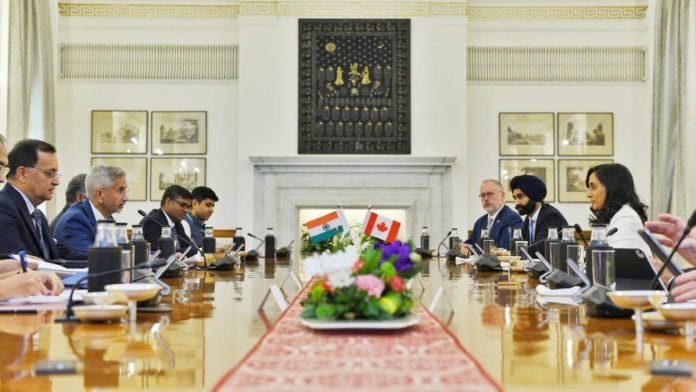New Delhi: External Affairs Minister S. Jaishankar is expected to travel to Canada next week and hold meetings with his counterpart Anita Anand and likely call on Prime Minister Mark Carney. He is also expected to attend the G7 Foreign Ministers’ Meeting there.
The visit comes as India and Canada continue to rebuild ties following the political thaw set in motion by Prime Minister Narendra Modi and Carney earlier this year. Modi had travelled to Canada in June for the G7 leaders’ summit. He met Carney on the margins of the summit, which led to agreement towards confidence-building measures between the two countries.
In August, New Delhi and Ottawa almost simultaneously appointed high commissioners as the first step to stabilise ties. The respective high commissioners have since submitted their letters of accreditation and begun work at their missions.
Jaishankar’s visit is due around the G7 Foreign Ministers’ Meeting scheduled to take place on 11 and 12 November in Ontario. It would mark the second set of high-level engagements between New Delhi and Ottawa in as many months. Anand had travelled to India last month and held talks with Jaishankar while also calling on Modi.
Anand’s visit saw a new roadmap for cooperation between New Delhi and Ottawa unveiled. The two countries are looking to deepen ties in areas such as advanced technologies, trade, civil nuclear cooperation and critical minerals. They also agreed to relaunch existing mechanisms such as the energy dialogue.
In September, Canada’s National Security and Intelligence Adviser Nathalie G. Drouin had travelled to New Delhi and held meetings with National Security Adviser Ajit Doval. The Doval-Drouin meeting restarted security engagement between the two countries.
India’s ties with Canada cratered following former PM Justin Trudeau’s statement that Ottawa was investigating “credible allegations” that Indian officials were involved in the killing of Sikh separatist Hardeep Singh Nijjar.
Nijjar, an India-designated terrorist, was killed outside a gurdwara in British Columbia in June 2023.
Trudeau’s statement in September 2023 led to India pushing Ottawa to downsize its diplomatic presence in its Indian missions. Around 13 months later, India withdrew its High Commissioner Sanjay Kumar Verma in Ottawa along with five other diplomats after Canada requested New Delhi to waive their diplomatic immunity for its investigations into Nijjar’s killing.
India has consistently rejected Ottawa’s allegations, labelling them as “absurd and motivated.” India’s incumbent High Commissioner Dinesh K. Patnaik as recently as last month pointed out that no evidence has been shared by Ottawa regarding the allegations till date.
Carney has taken a different approach to ties with India. The two prime ministers have let the security issues and challenges be discussed at the appropriate levels, while focusing on stabilising ties in other areas. For Ottawa, India has gained significance in the last 10 months following the return of Donald Trump to the US White House.
With the stabilisation of ties under process, expectations for reopening negotiations on a free trade agreement are growing. Patnaik, in comments to the Canadian media last month, said discussions on such a pact would have to be started by Ottawa, given that it was the government of Canada that suspended talks in September 2023.
(Edited by Nida Fatima Siddiqui)






